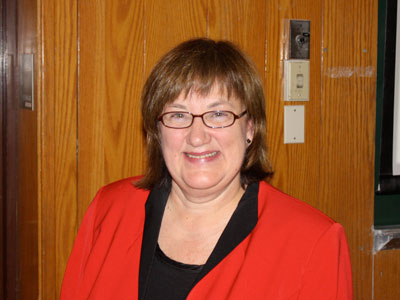Last week’s physics colloquium was a study in the “Unthinkable” of nuclear technology, what is being done to prevent it, and what to do if it happens. Dr. Jolie Cizewski of Rutgers University arrived to speak about applying nuclear physics in addressing the concerns of national security. Cizewski explained that in order to stem the spread of nuclear weapons, there must be a worldwide commitment to address the challenge. She outlined the four key points to addressing the issue, including the safeguarding of materials, detection of radioactive materials, proper response, and the assessment and attribution of the technology.
One of the largest roles nuclear science plays in national security applications is in detectors. If the materials can be consistently located before they reach their destinations, it sends a strong message to those interested in using them. A main method of detection is in sensing the presence of fission. This utilizes an understanding of the probability of fission occurring in the two most ‘common’ fissionable isotopes for weapons, U-235 and Pu-239. Passive detectors can take advantage of the fact that fissionable materials emit radiation bursts as part of multiplying fission chains. Another passive method takes advantage of background radiation; very heavy elements are able to scatter muons, background radiation due to cosmic events, and detectors can sense this scatter. A final method uses fluorescent imagining for the isotopic detection of nuclear materials.
Then Cizewski posed the question, “But what happens if the unthinkable occurs? We don’t want to think about it, but we have to know what to do if it happens.” While such an event would be terrible, there should at least be comfort in knowing that there are plans in place to deal with such a disaster. The nuclear forensics process is very straightforward in nature, but highly technical and extremely time sensitive. This is mainly because the residual radioactive materials continue to decay further as time passes after the incident. The longer that the analysis takes, the harder it becomes to accurately characterize the materials used. In a ‘perfect situation,’ the information gained from the characterization of the remaining actinides and other fission products could make the difference in accurately identifying those responsible. Here, Cizewski stressed the importance of international collaboration in nuclear science. She then explained in detail some of the different products that can be detected during a forensics investigation and some of the detectors being developed to more accurately characterize these products.
Cizewski wrapped up her lecture by once again stressing the importance of trained scientists and the mission of universities in training the next generation. One of the biggest challenges in preventing the unthinkable is in detection. While the best system could be developed, if it canott be easily operated by a user with nothing more than a high school education, it will most likely not operate to its full potential. This is the place of future scientists and engineers as they attempt to answer today’s questions in order to prevent tomorrow’s problems.



'Physics colloquium goes nuclear' has no comments
Be the first to comment this post!